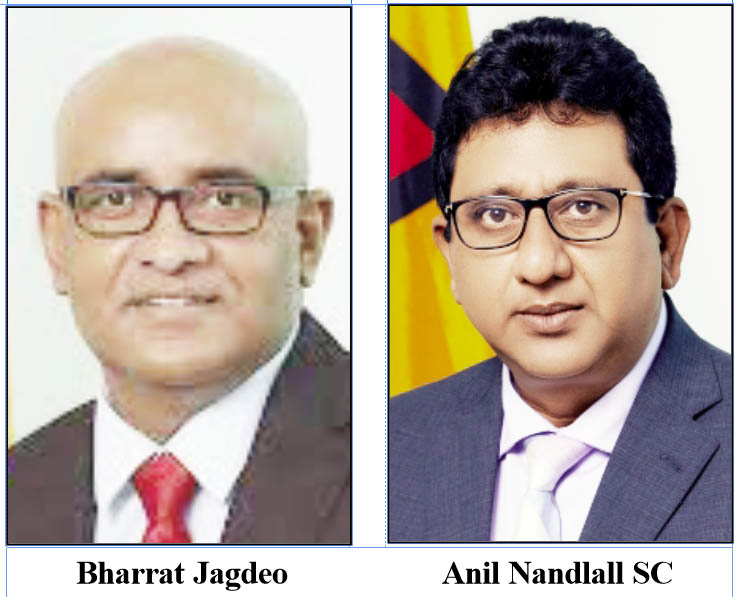Vice President Bharrat Jagdeo and Attorney General Anil Nandlall SC have been granted leave to appeal to the Caribbean Court of Justice (CCJ), the Guyana Court of Appeal’s ruling that it has jurisdiction to hear the appeal of the dismissal of the Opposition APNU+AFC’s election petition which challenged the results of the March 2nd 2020 general elections.
Leave was granted to the intended appellants yesterday by the local appellate court which has also stayed its ruling, pending the full hearing and determination of Jagdeo’s and Nandlall’s appeal before the CCJ.
At a hearing yesterday morning of the motions seeking leave, Senior Counsel Douglas Mendes argued on behalf of the VP that in accordance with Section 6 of the CCJ Act they were entitled “as of right,” to mount an appeal.
Senior Counsel Roysdale Forde who represents Monica Thomas and Brennan Nurse by whom the petition was filed, contended that leave ought not to have been granted, as his clients’ substantive appeal is yet to be heard by the local appeal court.
He advanced that there is no precedent locally, regionally or otherwise to support in the particular circumstances, an appeal to the CCJ following the ruling on an interlocutory issue.
He said that the practice has always been; and endorsed by the CCJ itself, that appeals be first fully heard and determined at local appellate courts of contracting States, as a prerequisite to being taken before it for further challenge.
Mendes was, however, successful in persuading the Bench of the local court that in accordance with Section 6 of the CCJ Act they had a right to appeal, whether it was a ruling stemming from an interlocutory matter or not.
On that point he argued that the local court of appeal did not have the jurisdiction to deny his client that inherent right.
He went on to advance that the decision in question is “an appealable one” as the issues therein touch and concern provisions laid down in Article 163 (3) of the Constitution which need final determination by the court of last resort for which Section 6 also caters.
Further, he argued that the matter is of grave public importance adding that the particular issues raised therein are being canvassed for the first time and would also need pronouncement from the final court.
This position, he said, is given credence by Section 7 of the CCJ Act.
Mendes’ sentiments were echoed by Solicitor General Nigel Hawke who appeared on behalf of the AG.
After hearing the submissions, acting Chancellor Yonette Cummings-Edwards said that notwithstanding Forde’s arguments, the Court was inclined to grant the leave sought as provided for in Section 6 as well as Sections 7 of the CCJ Act.
She noted that specific regard was also being given to the fact that the matter is of significant public importance.
At the same time, she announced that the local court’s decision will be stayed until the CCJ makes a ruling.
On December 21st, last, the local court of appeal in a majority 2-1 decision ruled that it has jurisdiction to hear the appeal of the petition. Chancellor Cummings-Edwards and Justice of Appeal Dawn Gregory concurred with each other, while Justice of Appeal, Rishi Persaud dissented.
Acting Chief Justice (CJ) Roxane George had previously thrown out the petition, after finding that presidential candidate of the APNU+AFC, David Granger was not served on time.
The petitioners would later appeal to the Guyana Court of Appeal, arguing that the Chief Justice erred in law.
Mendes and the AG, however, argued that since the CJ’s decision was not in relation to a final order of the Court it was incapable of being appealed.
Thomas and Nurse were contending in their petition that the elections were unlawfully conducted and/or that the results (if lawfully conducted) were affected or might have been affected by unlawful acts or omissions. They nonetheless argue that from those polls it is Granger who should be declared the duly-elected President of Guyana.
In the other of the two petitions filed by the Opposition, which is also before the Court of Appeal, petitioners Claudette Thorne and Heston Bostwick want the Court to determine, among other things, questions regarding whether the elections have been lawfully conducted or whether the results have been, or may have been affected by any unlawful act or omission and, in consequence thereof, whether the seats in the National Assembly have been lawfully allocated.
On April 26, 2021, Chief Justice George threw out that petition also brought on behalf of APNU+AFC challenging the results of the March 2nd 2020 general elections.
She found that the recount order and section 22 of the election laws act did not contravene the Constitution as had been argued by counsel for Thorne and Bostwick.






